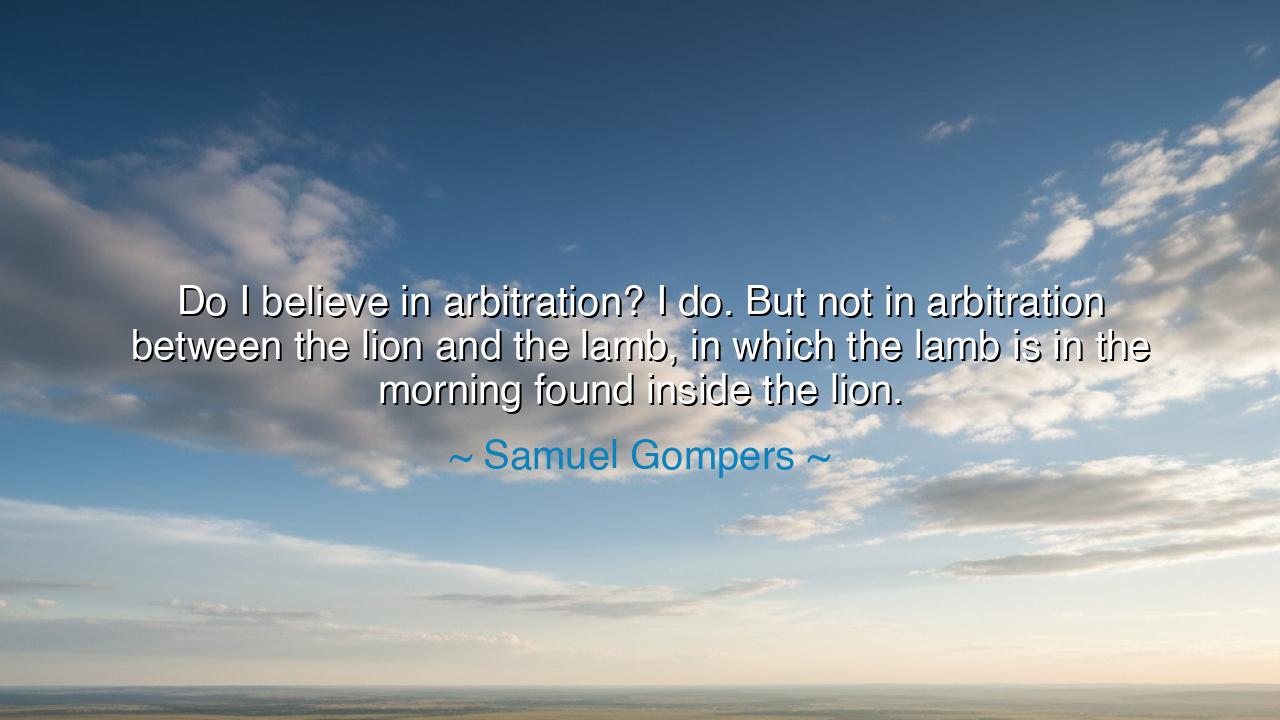
Do I believe in arbitration? I do. But not in arbitration
Do I believe in arbitration? I do. But not in arbitration between the lion and the lamb, in which the lamb is in the morning found inside the lion.






Samuel Gompers, father of the American labor movement, declared: “Do I believe in arbitration? I do. But not in arbitration between the lion and the lamb, in which the lamb is in the morning found inside the lion.” His words thunder with imagery, yet the meaning is clear: true fairness cannot exist where power is so unequal that the weak are devoured regardless of the outcome. Arbitration in its purest form is noble, but arbitration without balance is merely another mask for domination.
The lion in Gompers’ vision represents the forces of wealth, industry, and unchecked power. The lamb stands for the workers—fragile, dependent, seeking survival. To speak of arbitration between these two without safeguards is to invite farce. For the lamb may sit at the table, may offer its case, but by dawn it is swallowed whole. The words remind us that justice cannot be found where there is no equality of strength, where one side is armed with claws and teeth, and the other with nothing but hope.
The origin of these words lies in the struggles of labor in the late 19th and early 20th centuries. Workers, crushed by long hours, meager wages, and dangerous conditions, sought redress against vast corporations. Gompers, leading the American Federation of Labor, knew that compromise and negotiation were often necessary. But he also knew that if workers lacked the power to strike, to organize, and to defend themselves, then arbitration was no more than a polite ritual before inevitable defeat. He cried out against the illusion of fairness when the scales were so heavily weighted.
History gives us countless mirrors of this truth. Consider the serfs of medieval Europe, “free” in name but bound in fact, who were told they had a voice but in reality were silenced by hunger and fear. Or think of colonial subjects summoned to councils where their opinions were “heard” but ignored, the outcomes already decided by the empire. In every age, the lion and the lamb have sat at tables together, and in every age, unless the lamb found strength, the result was the same: disappearance into the belly of the beast.
Gompers’ lesson reaches beyond the field of labor. In every relationship—between nations, between classes, between individuals—arbitration without balance is hollow. The strong will always consume the weak if there are no laws, no protections, no will to resist. Justice requires not only words but structures: rules that defend the vulnerable, courage that demands fairness, and solidarity that gives the lamb a voice louder than its own.
The deeper meaning of his words is a call to vigilance. Never be deceived by appearances of fairness when power is lopsided. The lion may smile, may speak softly, but its nature does not change. The lamb must find allies, must gain strength, must build walls of law and community to keep itself from being devoured. For only when both sides meet with true equality can arbitration bear fruit.
Therefore, let this wisdom guide us: seek peace, but not at the price of justice. Believe in dialogue, but not in surrender disguised as dialogue. When you find yourself in the place of the lamb, do not step blindly into the lion’s den. Instead, gather your strength, find your voice, and demand fairness on equal ground. For only then will arbitration be real, and only then will the lamb greet the morning still alive, standing side by side with the lion not as prey, but as equal.






AAdministratorAdministrator
Welcome, honored guests. Please leave a comment, we will respond soon